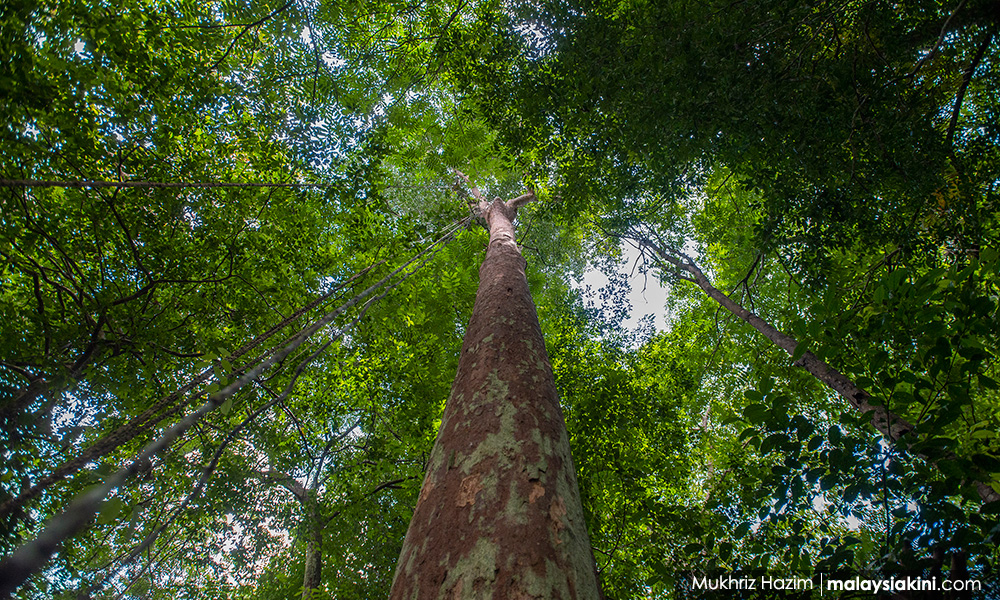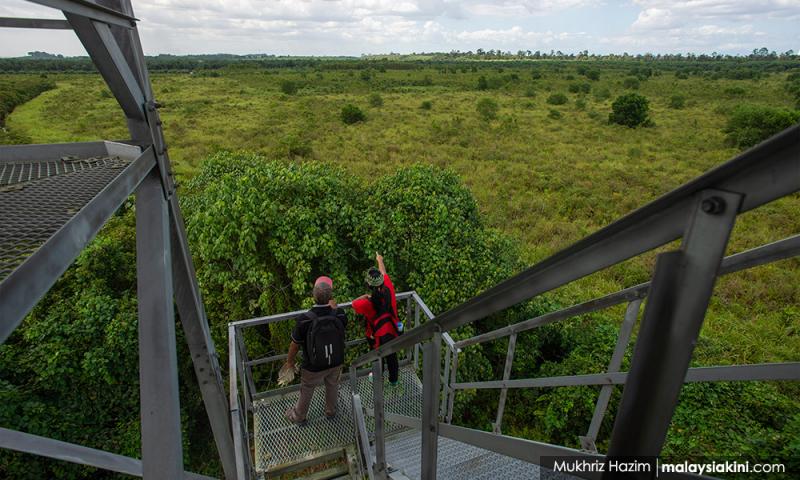LETTER | North Kuala Langat Forest Reserve - enough is enough
LETTER | "My country, the land where my blood has spilt ", is the English translation of the first two lines of the Malaysian national anthem, the song Negaraku which is so magnificently sung since school.
It is not just the opening song of every official occasion but the identity of every Malaysian and a symbol of love and affection for a country that is rich in biodiversity and earth's resources that Malaysia was even called Suwarna Bhumi (golden land) by travellers.
The spirit of patriotism is undeniably so high among Malaysians which is more pronounced since the spread of Covid-19 in the country, but rarely do we think about the environmental health which is not only the source of air we breathe, water and food we consume but also the "rice bowl" of some community who are fully dependent on its sustainability to maintain their livelihoods, such as the Orang Asli community in the North Kuala Langat Forest Reserve (NKLFR).
NKFLR is one of the permanent forest reserves in the state of Selangor which was gazetted around the 1920s and has a very unique ecosystem where most of the forest area is peat swamp forest.
This forest holds a thousand and one natural treasures that have existed for thousands of years and have also been occupied by the Temuan Orang Asli community for more than 150 years.
This forest can be considered as the lifeblood of this community that it has become a place of their dependence to carry out daily economic, cultural and social activities for their survival.
Since the news broke about the degazettement of the forest, the Temuan community has felt as though threatened and seemed to have no rights to their own shelter and source of income.
Not only that, but the news of the gazetting of the peat swamp forest was also opposed by a large number of Malaysians, including the North Kuala Langat Forest Reserve Coalition (PHSKLU) which is consisted of several local organisations and environmental activists.
This is because the forest also has various other important roles in maintaining environmental health and sustainability that cannot be denied any longer and should already have more than enough evidence and justification to cancel the Selangor government's proposal.
Among the main reasons for objecting to the proposed degazettement of NKFLR include ensuring the well-being and the quality of life of all human beings as well as the environment can be preserved in order to maintain the sustainability of global biodiversity.
NKFLR is a wetland that has a very dynamic ecological nature. A wetland is a significant biome and an area at which is inundated by water with varying environmental conditions like continuous changes in salinity, soft sediments and low oxygen content and that it is also amazingly rich in vegetation that is able to adapt and withstand such conditions that are often referred as “challenging” by most researchers.
It is one of the most diverse and wealthiest ecosystems that has been a great benefit to both human and nature at the same time in many different ways.
These benefits are better known as ecosystem services as a universal term used as in the returns the human gain from the properly-functioning and natural environment in terms of provision of food, security and natural resources.
More than they benefit us with all their services, they also maintain the environmental quality, help to sustain livelihoods as well as by supporting vast biodiversity regardless of the dynamic and complex environment.
In general, ecosystem services can be divided into four different types including provisioning services, regulating services, cultural services and supporting services.
Provisioning services are the kind of services that are provided by the ecosystem in the form of materials and energy including food, medicinal resources, biochemical, water, air purification and fibres.

For instance, practising community agricultural activities that are done in a sustainable way without the use of chemical-based pesticides and fertilisers that help in supporting the ecosystem health and neighbourhood.
Other than that provision of water, carbon dioxide and oxygen also are the reasons why we are able to breathe fresh air from the environment and plants are able to make their food via photosynthesis.
Even though agricultural activities can be as useful as they may seem but they can also harm the environment when it is done on a larger scale, especially when it affects the natural habitat of many animals and vegetation that would affect directly humans from food businesses to livelihood of the people who lives there.
Wetlands are also a great source of biochemical resources. This includes the pharmaceutical industries that use the natural resources found in the wetlands as a direct source or even as a source of inspiration for biomimicry processes.
It has been found that genetic materials from plants and vegetation in the wetlands are being used to counter diseases and increase the resistance of plants from pests and other unwanted nuisance in agriculture that has led to genetically modified food and agriculture yields.
Besides, regulating services are the benefits we obtained from the regulation of ecosystem processes like disease control, water and air purification or climate regulation.
As we all are informed, wetlands are one of the biggest stores of carbon. It is responsible to regulate the amount of oxygen, carbon dioxide and other gases in the ecosystem which eventually also regulates climate change.
Apart from that, it also provides freshwaters with systematic management actions at a relatively much lower cost than the water coming from the treatment plants.
This is due to the vegetation that controls flood, water flow and quality as well as the microorganisms and soil dwellers that affect the soil structure and purifies the water.
Next, supporting services that are also known as a habitat service which is another importance of the wetlands ecosystem which provides habitat for living organisms including human being as well as to maintain the genetic diversity in a gene pool.
This type of service is highly essential as a habitat provides everything an animal or a plant would need for living including food, water and shelter which are three most needed basic needs for all especially for migratory species that depends on the different environment along their migrating tracks.
This also includes to maintain the viability of gene-pools and it is important to develop a variety of species within a population.
It also distinguishes different breeds for animals and races for humans from each other as well as providing the basis for a well-mixed community and which especially has made Malaysia a biodiversity hotspot, as an example.
Last but not least, cultural services which are the kind of services that human obtains in the form of spiritual and holistic enrichment, intellectual development, aesthetic values and recreational.
Wetlands are also known for their amazing aesthetic values where people go for emotional peacefulness and even as an inspiration for art with astonishingly beautiful natural landscapes.
It is also associated with some religion and cultural practices for some in many parts of the world. It is seen as sacred and for having religious meaning as nature is a common ground for most religion and beliefs.
Besides being a place that is full of culture and a hub for mental and physical heal, it is also an incredible economic source for some countries through the eco-tourism industry.
Wetlands ecosystem plays a vital role in everyone’s lives in various ways, therefore proper care and sustainable management are needed to ensure that these unique natural characteristics would sustain to cater the human valuable functions.
On the whole, it turns out that the degazettement of NKLFR brings more harm than good to the environment as well as to the future of human well-being.
I personally feel challenged not only as an environmental activist but as a Malaysian to protect the biodiversity of flora and fauna in the country, get clean water and air as well as food sources that are of high quality and nutritional for me, my family, and all other Malaysians.
The famous George Santayana had said that "those who do not learn from history will surely repeat it".
In the past, we were deceived, ridiculed and trampled by foreign colonisers until all the wealth of Malaysia was exploited, and now we seem to be colonising our own country.
With this, I stand hand-in-hand with all Malaysians including the PHSKLU and the Temuan community to protest and vehemently reject the proposed degazettement of the permanent forest reserve status for the NKLFR.
The views expressed here are those of the author/contributor and do not necessarily represent the views of Malaysiakini.
RM12.50 / month
- Unlimited access to award-winning journalism
- Comment and share your opinions on all our articles
- Gift interesting stories to your friends
- Tax deductable
